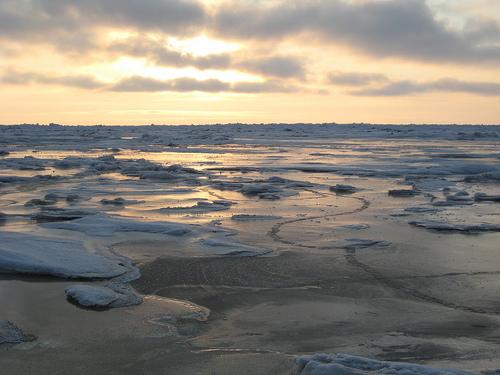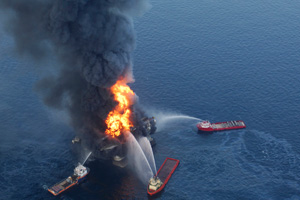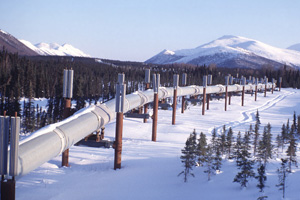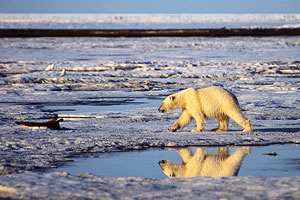
Photo of the Chukchi Sea by rnoblin, <a href="http://www.flickr.com/photos/rnoblin/3523006784/">via Flickr</a>.
Last summer’s Deepwater Horizon disaster gave the nation a taste last year of the disastrous implications of an oil blowout in the Gulf of Mexico. And that blowout occurred in warm waters that were relatively easy for responders to reach. But what about a massive spill in the icy waters of the Arctic? Unless the Obama administration puts the brakes on the permitting process, Shell could begin exploration off the coast of Alaska as early as this summer, despite the fact that response capability and information about the environmental impacts of a spill there are sorely lacking, according to the National Oil Spill Commission.
The commission on Tuesday outlined a number of steps that Congress needs to take to help avert a future crisis like the one in the Gulf. But on Arctic drilling, the administration has the capacity to step in and stop Shell without needing approval from Congress. In late 2009, the Department of Interior greenlighted Royal Dutch Shell to begin exploration in the Chukchi and Beaufort seas off the northern coast of Alaska. It looked like that exploratory drilling there could begin last summer, but the temporary moratorium that the Obama administration imposed following the Gulf spill delayed that (though that moratorium has since been dropped).
The plan to expand offshore drilling that the Obama administration laid out last March opened more areas of the Arctic for drilling. While the administration later walked back its plans to expand drilling following the Deepwater spill, the Arctic is still on the table; Interior Secretary Ken Salazar said in December he plans to take a “cautious” approach to issuing new leases there, after completing a new environmental review and evaluating spill response capabilities. The administration also signaled that it plans to move forward with the permitting process that would eventually allow Shell to begin drilling on its lease in the Beaufort, though an exact timeline for decisions is not clear. A new environmental assessment on that application is currently underway.
Environmental groups have been fighting to halt Arctic exploration for some time, arguing that the areas under consideration for drilling would be particularly vulnerable should a spill occur; the Interior Department, they say, has so far done an inadequate job of evaluating the potential environmental threats drilling there poses.
While acknowledging that there the Arctic is an “important area for future oil and gas development,” the commission advised that much more research and investigation should be conducted before it moves forward. Geological and environmental information about the region is lacking, as are the industry and government institutions that would be needed to ensure it is done safely, the commission noted. Exploration there should be undertaken with “the utmost care,” the commission advised.
The need for caution in the Arctic is pretty clear, as both the spill commission and a recent report from the Pew Environment Group have concluded. The region is covered with ice eight to nine months out of every year. Sub-zero temperatures are the norm. It’s dark most of the day during the winter months. High winds, major storms, and heavy fog are common. Organizing a spill response there would be quite challenging, and cold environment also means that oil would degrade more slowly. In addition to an inhospitable climate, the nearest Coast Guard station is 1,000 miles away and doesn’t have the kind of vessels that would be needed to deal with a spill in the ice. It’s also a rich ecosystem, home to whales, walruses, and bears, among other species.
The commission recommended that the Department of Interior take steps to “ensure that the containment and response plans proposed by industry are adequate” and backed up by demonstrated financial and technical resources. They also advise that the Coast Guard and oil companies “carefully delineate their respective responsibilities in the event of an accident,” and that Congress provide adequate funding for the Coast Guard to fulfill those responsibilities.
For now, enviros argue that the Arctic exploration plans should be put on ice until there’s more information available. Moving forward now would be “reckless,” argued Bill Eichbaum, vice president of marine and Arctic policy at the World Wildlife Fund. “We think that the Department of Interior should suspend the consideration of any further permitting or leasing for oil development activities until they have addressed each of these issues,” he said.
Shell has invested $3.5 billion in its Arctic exploration program, but it’s already faced several set backs. Earlier this month, environmental groups successfully challenged Shell’s air quality permit. (Shell did not respond to a request for comment about the spill commission’s findings.*) Whether the commission report will prove to be another obstacle is unclear. “Secretary Salazar believes we need to continue to take a cautious approach in the Arctic that is guided by science and the voices of North Slope communities,” said Salazar spokeswoman Kendra Barkoff in a statement on Tuesday.
But enviros are hoping the spill commission report will serve as validation of their concerns about Arctic drilling plans. “Until Shell can prove they can clean up an oil spill, allowing drilling to go forward is the wrong decision,” said Leah Donahey, Arctic Ocean campaign director at the Alaska Wilderness League.
*UPDATE: Shell sent over a comment on the report on Wednesday afternoon outlining steps that the company has taken to “make an already-robust Arctic exploration plan, even stronger.” Spokeswoman Kelly op de Weegh said the company has undertaken “dozens of Arctic studies” and believes that “significant data exists to proceed with an exploration program.”
“We look forward to achieving a more thorough understanding of the Commission’s recommendations and assessing perceived gaps against the unprecedented steps Shell has taken to pursue safe, environmentally responsible exploration in shallow water off the coast of Alaska,” said op de Weegh.














